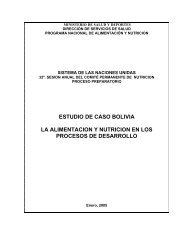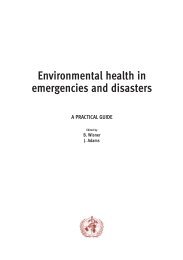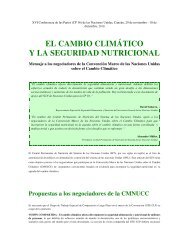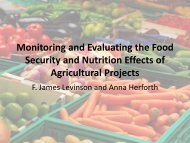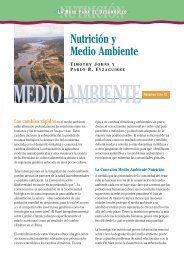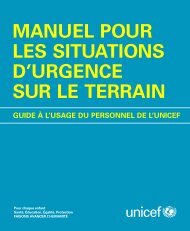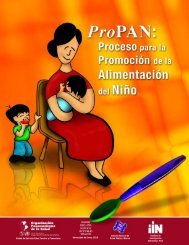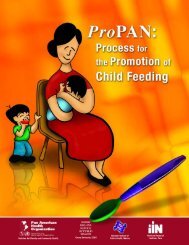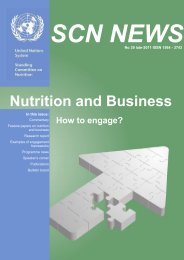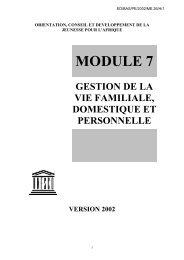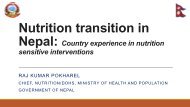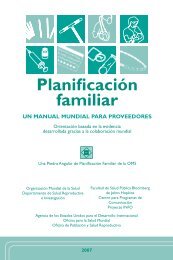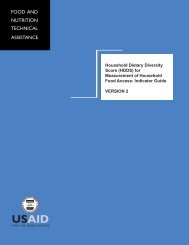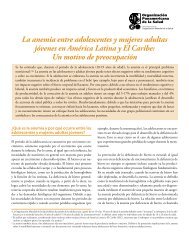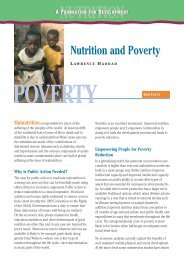SCN News No 36 - UNSCN
SCN News No 36 - UNSCN
SCN News No 36 - UNSCN
Create successful ePaper yourself
Turn your PDF publications into a flip-book with our unique Google optimized e-Paper software.
www.unsystem.org/scn FEATURES 9<br />
Despite the recent progress, a large share of the population still lives in a situation of poverty. Brazil still has<br />
one of the highest Gini coefficients in the world, as a result of a historic process of economic growth with<br />
inequitable distribution of income and opportunities.<br />
Given this context, overcoming the serious and interrelated problems of poverty and inequality in Brazil<br />
requires a sustained and integrated effort from all levels of government and also from civil society.<br />
The Zero Hunger Strategy<br />
The Zero Hunger strategy (Fome Zero), which coordinates programmes from 11 ministries, in partnership with<br />
civil society, plays a fundamental role in improving the living conditions of the population. It also contributes to the<br />
introduction of the food and nutrition security element to the public policies agenda, both in Brazil and abroad.<br />
We have implemented integrated actions concerning the human right to adequate food. These in turn provide<br />
the foundations for the Zero Hunger strategy, in order to ensure the production, availability and regular access<br />
to high quality food for everyone. We have also invested in strategies for impact evaluation of food and nutrition<br />
security policies and programmes. One important step was the creation in 2004 of a baseline measuring<br />
the various levels of food insecurity in Brazil, based on the Brazilian Scale of Food Insecurity (EBIA). This will<br />
allow subsequent impact evaluations of Brazilian food and nutrition security policies (SAGI/MDS 2007).<br />
The Federal Law for Food and Nutrition Security<br />
Another important step to ensure the human right to adequate food in Brazil was the introduction of a Federal<br />
Law for Food and Nutrition Security – Law <strong>No</strong>. 11346, from September 15, 2006. This created the National<br />
System for Food and Nutrition Security which aims to integrate initiatives within this area. This law grants the<br />
status of public policy to food and nutrition security, thus requiring the State to enforce the universal right to<br />
regular and permanent access to good quality food in sufficient quantities, based on healthy food practices<br />
which respect cultural diversity and which are environmentally, culturally, socially and economically sustainable.<br />
The National Council on Food and Nutrition Security – CONSEA<br />
The Brazilian policy on food and nutrition security is monitored by the National Council on Food and Nutrition<br />
Security – CONSEA, which congregates 18 State Ministers and <strong>36</strong> representatives of civil society, and is<br />
directly linked to the Presidency of the Republic.<br />
The policy implementation includes strategies for: strengthening family agriculture through financing,<br />
technical assistance and purchase guarantees; local initiatives to allow for access to food and water<br />
(subsidized restaurants, food banks, community kitchens, cisterns) and strategies directed towards school<br />
meals and the promotion of healthy food habits.<br />
The Bolsa Familia Program<br />
The cornerstone programme for the promotion of food and nutrition security is the Bolsa Familia Program,<br />
which benefits 11 million poor families. In return for a cash transfer, which allows for food purchases and<br />
some immediate relief of the difficulties created by poverty, families must keep their children in school, giving<br />
them the opportunity to break the intergenerational poverty cycle. They also must comply with an agenda for<br />
health monitoring, which includes vaccination, prenatal care and nutritional monitoring of pregnant and<br />
lactating women and children under 7 years old, thus ensuring their basic rights to health access.<br />
Bolsa Familia introduces an intersectoral approach, which is key to the social development debate, since<br />
there is a strong interdependence among all public actions directed to citizens living in poverty. In this sense,<br />
food and nutrition security policy must work in an articulated and synergetic manner with other policies on social<br />
assistance, health, education, and labour, thereby adding more effectiveness to the resources invested.<br />
Other initiatives<br />
Taking into consideration the intersectoral approach to public policy, the Brazilian Government has promoted<br />
various actions which have resulted in the improvement of the nutritional indicators of pregnant women and<br />
back to contents <strong>SCN</strong> NEWS # <strong>36</strong>



